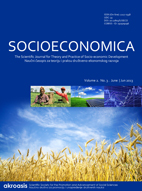MALI PORODIČNI BIZNIS U FUNKCIJI DRUŠTVENO - EKONOMSKOG RAZVOJA
SMALL FAMILY BUSINESS IN FUNCTION OF THE SOCIO-ECONOMIC DEVELOPMENT
Author(s): Zvezdan ĐurićSubject(s): Economy
Published by: Naučno društvo za promociju i unapređenje društvenih nauka AKROASIS
Keywords: Small business; family business; local economic development; family; management
Summary/Abstract: The process of global economic integration is having an increasing impact on national policy development, which is very difficult to control using traditional and under-empowered instruments of economic development. In the coming years have been difficult to plan economic objectives at the state level. All companies in the world, large and small, family and neporodična, public and private, developed or undeveloped, are faced with a number of issues that affect their future and perspective of development and, ultimately, questions the possibility of survival in an unpredictable and turbulent environment. What will be the market needs, the competition aims to change attitudes to the customer, where the water improvement techniques and technologies, as with the development of new products, there are possibilities of ensuring the necessary resources, where the water business globalization, what are the implications of the increased need for efficiency , effectiveness and innovation, and so on., questions are posed in front of all companies - regardless of whether they are family owned or not. What makes family businesses are uniqe, and what distinguishes them from companies that are not owned or controlled by the family, teh family is teh diversity of interests and the interests of the company in a unique system of family business. Worldwide, owners of family companies share the same philosophy and values: thinking long term, the capital of their patience and diligence, they care about the community in which they work, they work by the company in better shape that leave to heirs. Family company's business model is innovative and forward-looking, seeks to better execution, more vjednosti creates, maintains jobs - despite the cyclical declines and recessions. Development of small and medium-sized family businesses represent the fastest and cheapest way to develop the national economy. SMEs are the backbone of the economies of countries in transition, despite the large role in employment are important for the democratization of society.
Journal: Socioeconomica - Naučni časopis za teoriju i praksu društveno-ekonomskog razvoja
- Issue Year: 1/2012
- Issue No: 2
- Page Range: 155 - 165
- Page Count: 10
- Language: Serbian

